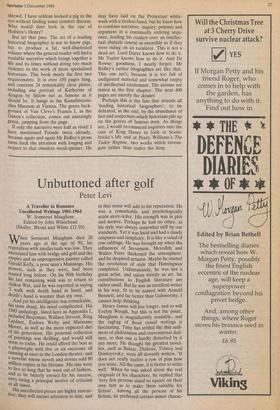Unbuttoned after golf
Peter Levi
A Traveller in Romance Uncollected Writings 1901-1964 W. Somerset Maugham Edited by John Whitehead (Muller, Blond and White £12.95)
When Somerset Maugham died 20 years ago at the age of 90, his reputation with intellectuals was low. They associated him with bridge and golf and the empire and an unprogressive painter called Gerald Kelly, a poor man's Munnings. His Powers, such as they were, had been wasted long before. On his 90th birthday his last remaining wish was to return to ,Ankor Wat, and he was reported as saying I walk with death hand in hand, and death's hand is warmer than my own.'
And yet his intelligence was remarkable, his taste sharp, his mind complicated. His .1943 anthology, listed here as Appendix I, Included Betjeman, Wallace Stevens, Ring Lardner, Eudora Welty and Marianne Moore, as well as the more expected diet of his generation. His personal collection of paintings was thrilling, and would still seem so today. He could afford the best as a Playwright with five or six successes all finning at once in the London theatre, and a novelist whose novels and stories sold 80 million copies in his lifetime. His sins were to live so long that he went out of fashion, and to be bitterly envied for his success, envy being a principal motive of criticism at all times.
His uncollected pieces are highly instruc- tive; they will attract attention to him, and in that sense will add to his reputation. He was a remarkable and psychologically acute story-teller. His strength was in plot and motive. Perhaps he had no other, as his style was always somewhat stiff by our standards. Yet it was lucid and had a dandy crispness and simplicity. It is like a salad of raw cabbage. He was brought up when the influences of Stevenson, Meredith and Walter Pater thickened the atmosphere, and he despised artiness. Maybe he started the revolution of style that Hemingway completed. Unfortunately, he was not a great artist, and taken strictly as art, his contributions to English literature are rather small. But he was an excellent writer in his way, fit to be named with Arnold Bennett, and far better than Galsworthy, I cannot help thinking.
Henry James will live longer, and so will Evelyn Waugh, but this is not the point. Maugham is magnificently readable, and the ragbag of these casual writings is fascinating. Time has settled the thin sedi- ment of philistinism and conventional dull- ness, so that one is hardly disturbed by it any more. He thought the greatest novel- ists, such as Balzac, Dickens, Tolstoy and Dostoyevsky, were all slovenly writers. 'It does not really matter a row of pins how you write. All the same, it is better to write well.' When he was asked about the real originals of his characters, he replied that `very few persons stand so square on their own feet as to make them suitable for fiction'. Among all the persons of his fiction, he preferred certain minor charac-
ters 'because they are gay, amusing and unscrupulous'. It all makes a refreshing change from Bloomsbury, though it scarce- ly promises greatness.
At the same time, one begins to sense his attraction, and to understand how formid- able, how unassailable, his reputation once seemed to be. He was at least as exciting as John Buchan, and austerity of construction and simplicity of motivation give him an additional strength. He had an avuncular worldly wisdom which was rooted in the late Victorian period. His essay on Virtue is impressive, though it overlaps with his curious view that the French were bound to be beaten in 1940 because their soldiers played cards in cafés instead of football like us.
At heart he was a profoundly romantic man. His famous story 'Rain', which has been successfully filmed three times (and I wish the BBC would present all three on one evening), depends on the most obvious motives and mechanisms. The obvious is thrilling when it goes on happening; it is like a hand of cards being played out to the end. Some of Scott Fitzgerald's better stories have a similar simplicity, and are as deeply romantic at the core. The tradition goes back to Maupassant, whose work may be a key to Somerset Maugham's, but since it is nearly 40 years since I was last excited by Maupassant, that is not a key I can use.
As a young man, Maugham was surpri- singly keen on Gissing. 'It is emotion which gives books of travel most of their value. The success of Pierre Loti, I fancy, comes from his recognition of this fact.' He goes on to compare Loti favourably with Flaubert, 'a semi-divine Baedeker'. How can so dry and brilliant a mind have made such a false assessment, even in 1901? He had been reading Gissing 'within sight and hearing of the grey sea, my limbs happily tired by the day's golf . No doubt he nodded off, like Homer. His own fiction has just the right speed, and his travel writing just the right pinch of enchant- ment.
The most valuable section of this fasci- nating but necessarily uneven compilation can be taken as advice to young writers. It is only 42 pages long, but his reasoning is shrewd and his words are well weighed. The trouble is that we almost never catch him unbuttoned, except after playing golf in 1901, or dining at the Royal Academy.























































 Previous page
Previous page